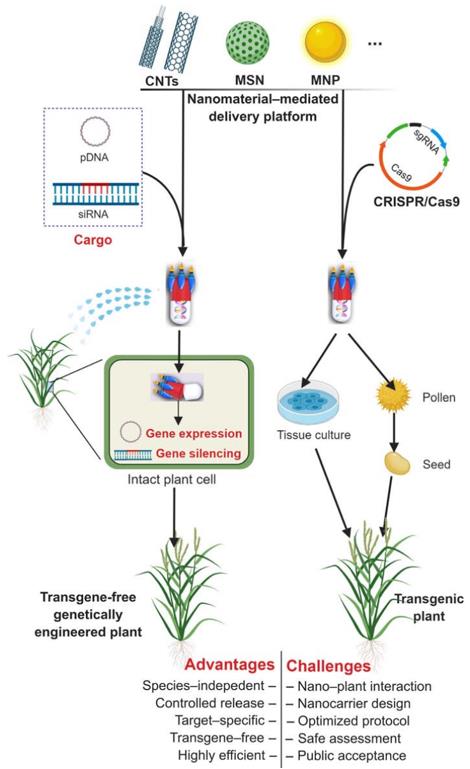Lifeasible focuses on the application of new technologies in plant protection. We assist in the application of nanotechnology in plant protection and provide services to help develop nanomaterials for plant genetic engineering.
In plant protection, genetic engineering can enhance plant resistance to biotic and abiotic resistance. Conventional plant genetic engineering such as Agrobacterium-, electroporation-, and polyethylene glycol (PEG)-mediated genetic transformation destroys plant tissues and has low transformation efficiency. In recent years, with the development of nanotechnology, nanotechnology-based gene delivery methods have been developed for plant genetic transformation. Although nanotechnology-based gene delivery methods are currently in their infancy, they have shown some advantages, such as good biocompatibility, adequate nucleic acid protection, and high transformation efficiency. In addition, nanotechnology allows the development of transgene-free genetically modified plants. Nanomaterial-based gene delivery can enable the delivery of functional genes or siRNAs to specific plant cell organelles, thus overcoming the host range limitation.
 Fig. 1 Nanomaterial-mediated plant genetic engineering (Wang et al., 2019).
Fig. 1 Nanomaterial-mediated plant genetic engineering (Wang et al., 2019).
The development of nanomaterials for plant genetic transformation contributes to plant genetic modification and indirectly contributes to plant protection development. We offer the following services to help develop nanomaterials for plant genetic engineering.
Development of passive delivery nanomaterial
We help develop a variety of delivery nanomaterials, including inorganic nano-delivery materials (such as gold nanoparticles, silicon nanoparticles, carbon nanoparticles, and oxide nanoparticles) and organic nanoparticles (such as chitosan nanoparticles, cell-penetrating peptides, and synthetic polymeric organic nanoparticles). We focus on developing delivery nanomaterials that can be passively delivered and can pass through plant cell walls, such as functionalized carbon nanotubes.
Development of nanomaterials for precise release control
We offer the development of nano-delivery materials based on specific environmental releases, including specific pH environments, specific disease process environments, and specific abiotic stress environments. pH-based release nano-delivery materials can enable precise delivery to chloroplast stroma (ca pH 8) or plant cell cytosol (ca pH 5.5). Nano-delivery materials based on the disease process can release antipathogenic substances (e.g., siRNA) when pathogenic-related molecules are detected. Nano-delivery materials based on specific abiotic stress environments can release the corresponding substances to protect plants under specific stress environments.
Safety assessment of nano-delivery materials
If there are safety hazards, nano-delivery systems cannot be used for plant protection. Although the government has no strict oversight of nanomaterial use, it is essential to investigate the risks of using these nanomaterials in agricultural systems. We offer services to help study the safety of nano-delivered materials. We help perform safety assessments for the application of nanomaterials in genetic engineering, including assessments of the food safety of edited plants, the environmental safety of edited plants, and the genetic safety of edited plants. Within the environmental safety assessment of edited plants, we will evaluate the impact of the edited plants on non-target organisms and the impact of litter on the surrounding environment.
Nanomaterials have a bright application in plant gene editing. The development of nano-delivery materials can contribute to the application of gene editing in plant protection. Lifeasible provides services to help study nano-delivery materials and offers services to help evaluate the safety of nano-delivery materials. If you have other needs related to nano-delivery materials, please contact our technical support staff.
References
Lifeasible has established a one-stop service platform for plants. In addition to obtaining customized solutions for plant genetic engineering, customers can also conduct follow-up analysis and research on plants through our analysis platform. The analytical services we provide include but are not limited to the following:
Get Latest Lifeasible News and Updates Directly to Your Inbox
Adaptive Evolutionary Mechanism of Plants
February 28, 2025
Unraveling Cotton Development: Insights from Multi-Omics Studies
February 27, 2025